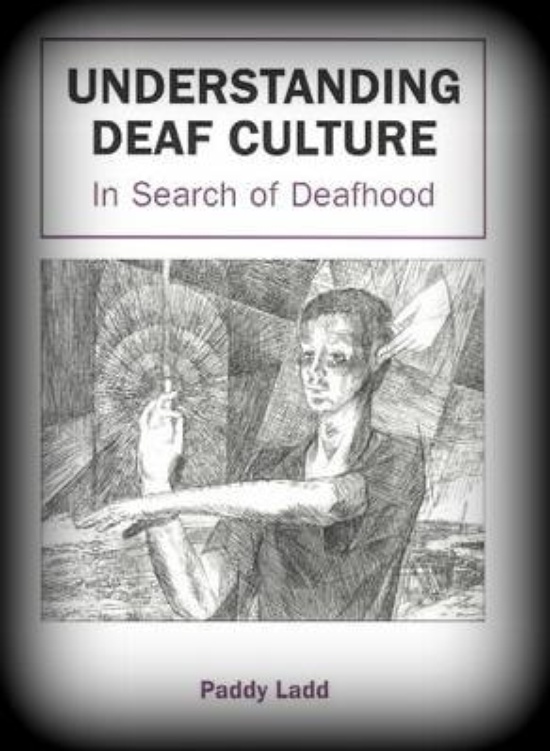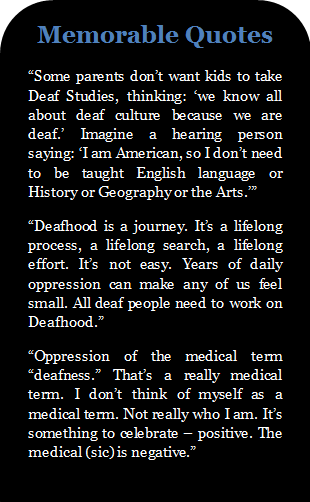What is Paddy Ladd’s “Deafhood” and Have We Found It Yet?
Posted by: Staff Writer on Nov. 12, 2012

It has its own Wikipedia entry. It has a custom sign (“DEAF” + “BELLY”). It literally gets on some peoples’ skin, in the form of tattoos and printed sweatshirts, and under the skin as our consciousness. “Deafhood” is everywhere. But on September 24, we – an audience of 200+ - got the inside scoop straight from the hands of the British guy who invented the term.
We now also know its antithesis: “Colonialism”. This is the dystopian picture that Paddy Ladd painted in his “Deafhood and Pedagogy” lecture hosted by the ASL Program in the University of Washington Department of Linguistics.
The friendly, lanky Brit is an activist, researcher, and international deaf scholar hailing from the University of Bristol's Centre for Deaf Studies. His watershed book “Understanding Deaf Culture: In Search of Deafhood” (2003) lines the bookshelves of many a ASL professor, student, and deaf culture scholar.
To say he geeks out a bit is putting it mildly. Nor does he mince words: He warns us that colonialism can trigger our cultural extinction. Ever heard Chulym, Yuchi, or Murinh-Patha? Probably not, but these languages are going extinct. Right now.
“Every 14 days a language dies,” reports the National Geographic’s Enduring Languages. If we’re not vigilant, ours could be next. Not in 14 days, but 14 years or 140 years from now.
So how can someone so dystopian also be so … uplifting? Because you feel the evangelical hope and energy in Ladd’s BSL (British Sign Language) gestures, and upbeat constructive wording of his PowerPoint slides. In seeing his BSL translated by two ASL interpreters, we are reminded of one of his central tenets: We are truly an International Deaf Community. None of this local dialect rubbish, where Ladd is concerned. If, in Ladd’s words, you’ve ever “used your deaf skills of visual thinking” while trying to sign with a deaf local in Athens, Tibet, or Perth … then you know exactly what he’s talking about.
 For juxtaposition, he revealed a historical shocker: Once upon a time, we were actually free of colonialism. Between the 1770s and 1850s, we flourished as educators, writers, statesmen, lawyers, and artists. In hearing peoples’ eyes, we were global citizens. Our sign language was considered a gift to the hearing folks. If a hearing Frenchman couldn’t sign, he was considered "incomplete” as a human.
For juxtaposition, he revealed a historical shocker: Once upon a time, we were actually free of colonialism. Between the 1770s and 1850s, we flourished as educators, writers, statesmen, lawyers, and artists. In hearing peoples’ eyes, we were global citizens. Our sign language was considered a gift to the hearing folks. If a hearing Frenchman couldn’t sign, he was considered "incomplete” as a human.
Our 21st Century jaws all hit the floor in silence. Together, we thought: My, how times have changed.
“Most hearing people are shocked to learn about oralism and believe deaf children should be taught sign by deaf teachers. Did deaf leaders of the 19th Century reject hearies? No, they didn’t suffer from oralism back then. In 1790, in the middle of the Revolution, there was a deaf guy chiseling sculptures. We have to rejuvenate that creativity,” Ladd urges.
His urgency is contagious. As Deaf Spotlight pointed out in a "Deafhood and Art" blog entry:
Paddy Ladd has a vision. He often shares with his audience a story about a large and corpulent museum. He gently guides us towards a smaller, hidden back room. As we brush off the dust and shake out the drop cloths, another world begins to emerge. With an enchanting BSL accent, Paddy asked the audience to imagine what our future would be ... In an ideal world, what role would Art play in Deaf children’s lives? I’d like to see bright, open schools where Deaf children meet and play under the sun before they head in their classes where they play with language and metaphor, English and ASL, to create their own worlds, either on print or in sign.
The overall message: We’re not doomed, so long as we fight for ourselves.
Ladd is a critical mover and shaker for a community facing colonial upheavals: Stem cells, cochlear implants, education cutbacks, and challenges to our fates as individuals as well as an entire culture.
“What does it mean to be here on Earth as deaf people? Are we a mistake, or is there a spiritual reason for us being here?” This is one of the many ideas Ladd asked an audience of over 200 to ponder.
“Us,” being the members of the deaf and Deaf-Blind Community, their alliances (such as interpreters, CODAs, and “PHPs” – Ladd’s term for “Positive Hearing People”), as well as ASL students.”
Whether newbies or veterans of Deafhood, our minds were blown.
“So glad I went to this lecture!” wrote deaf Seattleite Suz Ledet. “I left with the feeling of, One: "the deaf children are our future, we need to nurture them on learning how to embrace their disability in which they can use to empower themselves with"; Two: Instead of society making us feel inferior without our consent, we have countless opportunities to enrich their lives with what we can offer; Three: I loved watching Dr. Paddy Ladd lecture in BSL! I always get a thrill out of seeing International signs.”
Didn’t get to attend the lecture? Find some of Ladd’s big questions that we have been chewing on below:
- How would we restructure Deaf Education if we had full freedom to do so?
- What is the best way we can educate deaf children morally and spiritually, for life as full citizens?
- Should governments deal mostly with a deaf-run, deaf-elected body?
- Should we “measure” Deafhood at all?
- What would our world look like if Deafhood had never happened? (Hint: Read about Desloges (1779), Massieu & Clerc (1815), and Berthier & Colleagues (1820s))
- How did deaf people before Oralism think about themselves? Did they have Deafhood philosophies?
- How have we been oppressed, and what is the best way to describe that oppression?
Lastly, how can we “celebrate” Deafhood? Let us count the ways: You can join the International Deafhood Training Agency (since 2006, it’s held +100 workshops in 23 nations), watch the Deafhood Monologues on Ella Lentz’ “One Woman Deafhood Show,” join a Deafhood Reading/Consciousness-Raising group (USA), or get involved with the Deafhood Foundation.
Whatever your personal vision of Deafhood is, let it be the fire in your belly and the spark for your hands. Let it become your emotional DNA. Keep searching … and never stop searching for the answers within and without.
Tags
- deaf
- hard of hearing
- deaf blind
- deaf friendly
- deafhh
- deafhood
- tattoos
- paddy ladd
- university of washington
- department of linguistics
- university of bristol
- centre for deaf studies
- chulym
- yuchi
- murinh-patha
- national geographic
- bsl
- british sign language
- deaf community
- athens
- tidbet
- perth
- oppression
- oralism
- deaf spotlight
- stem cells
- cochlear implants
- interpreters
- codas
- phps
- asl
- deaf education
- massieu and clerc
- berthier and colleagues
- deafhood monologues
- ella mae lentz




Comments